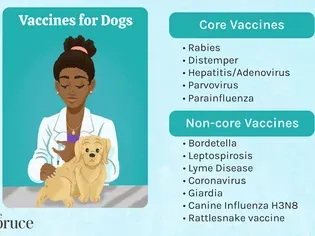List of Dog Vaccines
Updated on 04/26/24

Protect Your Furry Friend: The Comprehensive Guide to Dog Vaccines
Introduction
As responsible dog owners, ensuring the health and well-being of our beloved companions is paramount. Vaccination plays a crucial role in safeguarding their immunity and protecting them from potentially life-threatening diseases. This comprehensive guide will delve into the essential vaccines for dogs, providing detailed information on their purpose, schedule, and potential side effects.
Core Vaccines
Core vaccines are considered essential for all dogs, regardless of their age, breed, or lifestyle. These vaccines protect against the most common and severe canine diseases that can have devastating consequences if left untreated.
* Canine Distemper Virus (CDV): CDV is a highly contagious viral disease that affects the respiratory, gastrointestinal, and nervous systems. It can cause a wide range of symptoms, including fever, coughing, vomiting, diarrhea, and seizures.
* Canine Adenovirus-1 (CAV-1): CAV-1 is the primary cause of infectious canine hepatitis, which affects the liver and causes severe inflammation and damage. Symptoms can include fever, jaundice, vomiting, diarrhea, and abdominal pain.
* Canine Parvovirus-2 (CPV-2): CPV-2 is a highly contagious viral disease that primarily affects puppies and young dogs. It targets the gastrointestinal tract, causing severe vomiting and diarrhea, often leading to dehydration and electrolyte imbalance.
* Canine Parainfluenza Virus (CPi): CPi is a respiratory virus that can cause kennel cough, a highly contagious cough that is spread through contact with infected dogs. Symptoms typically include coughing, sneezing, and nasal discharge.
* Rabies Virus (RV): Rabies is a fatal viral disease that affects the central nervous system. Spread through the saliva of infected animals, rabies is a significant public health concern and is required by law in most areas.
Non-Core Vaccines
Non-core vaccines are recommended for dogs based on their individual risk factors and lifestyle. These vaccines protect against specific diseases that are less common or may only be necessary for certain dogs.
* Canine Bordetella Bronchiseptica (Bordetella): Bordetella is a bacterial infection that causes kennel cough. While not as severe as CPi, it can be highly contagious and can lead to respiratory discomfort.
* Canine Coronavirus (CCV): CCV is a viral infection that typically causes mild gastrointestinal symptoms, such as vomiting and diarrhea. It is not as severe as CPV-2 but can contribute to kennel cough.
* Canine Influenza Virus (CIV): CIV is a respiratory virus that causes flu-like symptoms, including coughing, sneezing, and nasal discharge. It can be spread through contact with infected dogs or through the air.
* Canine Leptospirosis (Lepto): Leptospirosis is a bacterial infection spread through contact with contaminated water or soil. It can cause a wide range of symptoms, including fever, vomiting, diarrhea, and liver and kidney damage.
* Lyme Disease (LD): Lyme disease is a bacterial infection transmitted through tick bites. It can cause lameness, fever, joint pain, and kidney damage.
Vaccination Schedule
The recommended vaccination schedule for dogs typically involves a series of vaccinations during puppyhood, followed by booster shots as they age. The specific schedule may vary depending on the type of vaccine, the dog's age, and any underlying health conditions.
Puppies:
* 6-8 weeks: First core vaccine
* 10-12 weeks: Second core vaccine
* 14-16 weeks: Third core vaccine (final dose)
* 16-20 weeks: Non-core vaccines (optional)
Adult Dogs:
* Every 1-3 years: Core vaccine boosters
* As needed: Non-core vaccine boosters based on risk factors and lifestyle
Side Effects
Like all medical treatments, vaccines can potentially cause side effects. However, most vaccines are well-tolerated by dogs. Common side effects may include:
* Mild fever
* Soreness or swelling at the injection site
* Loss of appetite
* Lethargy
More serious side effects, such as allergic reactions or anaphylaxis, are rare. If your dog experiences any severe or unusual side effects after vaccination, consult your veterinarian immediately.
Importance of Vaccination
Vaccinating your dog is one of the most important things you can do to ensure their health and well-being. Vaccination protects them from life-threatening diseases, reduces the spread of infectious diseases within the canine population, and helps maintain herd immunity.
By understanding the specific vaccines available and following a recommended vaccination schedule, you can effectively protect your furry friend from a wide range of preventable diseases. Remember to consult your veterinarian for personalized advice on the best vaccination plan for your dog.
Additional Tips
* Choose a reputable veterinarian.
* Keep accurate vaccination records.
* Inform your veterinarian about any health conditions or previous reactions to vaccines.
* Follow your veterinarian's recommendations for booster shots.
* Consider lifestyle factors when choosing non-core vaccines.
* Educate yourself about canine diseases and vaccination best practices.
By embracing these tips, you can ensure that your dog enjoys a long, healthy, and protected life. Vaccination is a gift of health that every dog deserves.
Explore More Pets

Basic Training
Puppy and Baby Introductions

Working Dog Breeds
All About Search and Rescue Dogs

Dog Treatments
Puppy Vaginitis: Signs, Causes and Treatment

Dog Adoption
After More Than 1,200 Days in the Shelter, Coco Goes Home

Basic Training
How to Train Your Puppy to Go on Potty Pads

Hybrid Dog Breeds
The Difference Between a Mutt, Mixed Breed, or Designer Dog?

Dog Treatments
Nail Problems in Dogs

Puppies
7 Reasons Why Two Dogs Are Better Than One